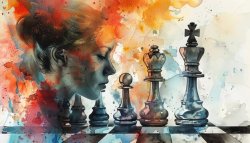
Whoever Controls Their Mind, Controls the Game
27.04.2025 08:18 | NewsChess is a silent game of storms. Two players, sixty-four squares, and an infinite number of possibilities. Outward calm, inner battle.
A single wrong move, a single moment of weakness – and the game is lost, not because of a lack of knowledge, but because the mind failed.
When I used to meet with Mr. Jansa – and I fondly remember those times – he often told me: it's all about the mind. You can be well-trained, but if your mind doesn't switch on, you're in trouble. I have seen enough over the chessboard to know that the mind matters the most. I remember when I had cancer, went through chemotherapy, and recovered – physically, everything was fine, but my mind couldn’t fully switch back to chess for at least a year. I also recall a friend whose father passed away; even six months after the sad event, he couldn’t play chess properly. One might think enough time has passed, but in sports, the mind is its own science.
That’s why I decided to write this article, and I would love it if you would join me by sharing your own experiences and stories. I love articles that we create together. Thank you.
Chess teaches us patience, logic, and courage. But without a healthy and strong mind, all knowledge often isn’t enough. The mind is the invisible battlefield where victory or defeat is decided.
Chess history is full of stories of masters who collapsed under pressure. Garry Kasparov, usually a powerhouse, sometimes couldn’t hide his anger and literally swept the pieces off the table after a lost game. Bobby Fischer, one of the greatest geniuses in history, canceled matches over small details like the lighting in the playing hall. And recently, young American talent Christopher Yoo, after a loss at the prestigious 2024 U.S. Championship, couldn’t handle the tension and, on his way out, struck a camerawoman from behind. An emotional outburst that led to a full-year suspension from the U.S. Chess Federation.
But emotional outbursts aren’t just a chess phenomenon. In other sports, emotions sometimes boil over too. John McEnroe, the legendary tennis hothead, was famous for arguing with referees, smashing rackets, and outbursts of rage. Zinedine Zidane, one of the world’s greatest footballers, ended his career with the infamous headbutt during the World Cup final. And who could forget the smashed rackets during moments of frustration from tennis players like Marat Safin? Sport isn’t just about the body – it’s above all about the mind.
More and more, I realize how important it is to devote the same attention to mental preparation as to theoretical training. Personally, before a game, it really helps me to replay a beautiful game – something calm, simple, and logical. Lately, I often replay games by Ulf Andersson. His chess is exactly what I need: calm, beautiful, and without unnecessary emotions. Just pure logic and patient positional work.
Before every game, I also try to implant a simple thought into my mind: the game might not go as planned, I might face problems, but I can handle them. I visualize moments from the past when I withstood tough situations. So when a crisis comes during a game, my mind is ready – it’s nothing new for it.
I also know how important it is to handle emotions properly after the game. I allow myself to feel joy or sadness until the evening. There’s a saying: "Celebrate in the evening, mourn in the evening, and start fresh in the morning." Every new day is a new game, a new battle. If I set my mind this way, I avoid unnecessary suffering after a loss, and I don't tire myself out chasing first place when things are going well. It’s all in the mind.
And because the mind determines results more than we often admit, here are a few simple tips that have worked for me:
One of the best exercises is a short visualization before the game. Close your eyes and see yourself sitting calmly, breathing steadily, focusing only on the next move, not the result. A few minutes of this exercise often does more than an hour of theory.
Another key thing is conscious work with mistakes. If I make a bad move, I deliberately tell myself: "It’s just one move. The game continues." I don't panic, I don’t make excuses in my head; I simply focus on the present.
Handling emotions after the game is equally important. Did I win? Good. Did I lose? Also good. Until the evening, I can feel joy or sadness, but in the morning everything is new. This simple internal discipline protects the mind from exhaustion during a tournament.
And finally – speak to yourself kindly. Don’t beat yourself up over mistakes; don’t be harder on yourself than necessary. Chess is a journey, not a trial. Every game, no matter the result, moves you forward.
Chess isn’t just about knowledge, combinations, and move counts. Chess is about how firmly you can stand when the storm hits.
And so – whoever controls their mind, controls the game.
PK
